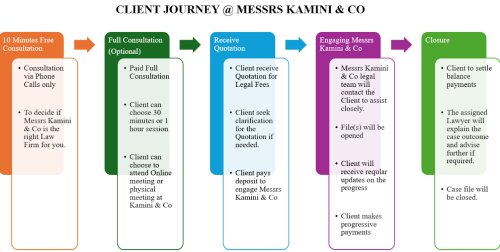Best Military Law Lawyers in Malaysia
Share your needs with us, get contacted by law firms.
Free. Takes 2 min.
Or refine your search by selecting a city:
List of the best lawyers in Malaysia
About Military Law in Malaysia
Military law in Malaysia is governed primarily by the Armed Forces Act 1972, which lays down the rules, regulations, and provisions concerning the conduct, duties, and discipline of members of the Malaysian Armed Forces. This legal framework establishes the military justice system, which operates under a different set of protocols from the civilian legal system. The military legal system is responsible for addressing offenses committed by military personnel, both in peacetime and during warfare, including matters like court-martials and disciplinary actions. Military law in Malaysia is instrumental in maintaining discipline, regulating conduct, and ensuring that military personnel adhere to high standards of behavior.
Why You May Need a Lawyer
Individuals might seek legal assistance in military law for various reasons. Common situations include being charged with an offense under military law, facing a court-martial, disputes regarding military service or benefits, experiencing discriminatory practices within the armed forces, and dealing with administrative actions such as potential discharge or demotion. Lawyers who specialize in military law can navigate the complexities of this specialized legal area, provide defense or representation, assist in understanding rights and responsibilities under the military justice system, and offer guidance on procedural matters.
Local Laws Overview
Military law in Malaysia emphasizes discipline, efficiency, and integrity within the armed forces. Key aspects of local laws relevant to military law include:
- Armed Forces Act 1972: Establishes the legal foundation for military discipline and the functioning of the military justice system, including court-martials.
- Military Courts: These are special courts where military offenses are tried, separate from civilian courts, adhering to military standards and procedures.
- ROAC (Rules of Armed Conflict): Regulations applicable to Malaysian military personnel regarding conduct during combat scenarios.
- Military Disciplinary Proceedings: Governs the process and handling of disciplinary cases within the armed forces.
- Benefits and Rights: Legal rights regarding service conditions, pensions, and other post-service benefits are also a crucial part of military law.
Frequently Asked Questions
What is a court-martial?
A court-martial is a judicial court for trying members of the armed services accused of offenses against military law.
How do military courts differ from civilian courts?
Military courts follow a distinct set of rules and procedures designed specifically for handling offenses by military personnel, with military personnel serving as judges and lawyers.
Can a civilian be tried in a military court in Malaysia?
No, military courts in Malaysia exclusively handle cases related to military personnel.
What kind of legal representation is allowed in military courts?
An accused in a military court is entitled to legal representation, which might be from a military lawyer or a civilian lawyer with expertise in military law.
Are there specific lawyers for military law cases?
Yes, there are lawyers who specialize in military law and understand the nuances of military regulations and procedures.
Can a decision made by a military court be appealed?
Yes, there is an appeals process within the military justice system whereby decisions can be reviewed by higher military authorities.
What are some common offenses tried under military law?
Common offenses include desertion, insubordination, conduct unbecoming of an officer, and other breaches of military discipline.
Does military law cover post-service benefits disputes?
Yes, military law can address disputes related to pensions, medical benefits, and other entitlements following military service.
What role does the military lawyer play in disciplinary proceedings?
Military lawyers provide counsel, representation, and defense during disciplinary proceedings and help ensure due process is followed.
What should I do if I believe my military rights are being violated?
If you believe your rights are being violated, you should seek the advice of a military lawyer immediately to explore your options and potentially address the issue legally.
Additional Resources
Here are some resources and organizations relevant to military law in Malaysia:
- Ministry of Defence Malaysia: Provides information on the policies, duties, and services related to national defense.
- Legal Aid Department: Offers legal support and advice, including for military-related issues.
- Royal Malaysian Army Lawyer's Office: Can provide guidance within the military system for armed forces members.
- Bar Council Malaysia: A professional body for lawyers which can refer you to specialists in military law.
Next Steps
If you require legal assistance in military law, it is advisable to take the following steps:
- Identify the specific issue or offense you are facing under military law.
- Collect any relevant documents and evidence that pertain to your situation.
- Consult with a lawyer who specializes in military law to understand your rights and options.
- Prepare for any proceedings by gathering testimonies or character references if applicable.
- Familiarize yourself with military procedures and terms to better understand the process you will be involved in.
By understanding military law and seeking professional legal assistance, you can effectively navigate any challenges you face within this specialized area of law.
Lawzana helps you find the best lawyers and law firms in Malaysia through a curated and pre-screened list of qualified legal professionals. Our platform offers rankings and detailed profiles of attorneys and law firms, allowing you to compare based on practice areas, including Military Law, experience, and client feedback.
Each profile includes a description of the firm's areas of practice, client reviews, team members and partners, year of establishment, spoken languages, office locations, contact information, social media presence, and any published articles or resources. Most firms on our platform speak English and are experienced in both local and international legal matters.
Get a quote from top-rated law firms in Malaysia — quickly, securely, and without unnecessary hassle.
Disclaimer:
The information provided on this page is for general informational purposes only and does not constitute legal advice. While we strive to ensure the accuracy and relevance of the content, legal information may change over time, and interpretations of the law can vary. You should always consult with a qualified legal professional for advice specific to your situation.
We disclaim all liability for actions taken or not taken based on the content of this page. If you believe any information is incorrect or outdated, please contact us, and we will review and update it where appropriate.
Browse military law law firms by city in Malaysia
Refine your search by selecting a city.
















